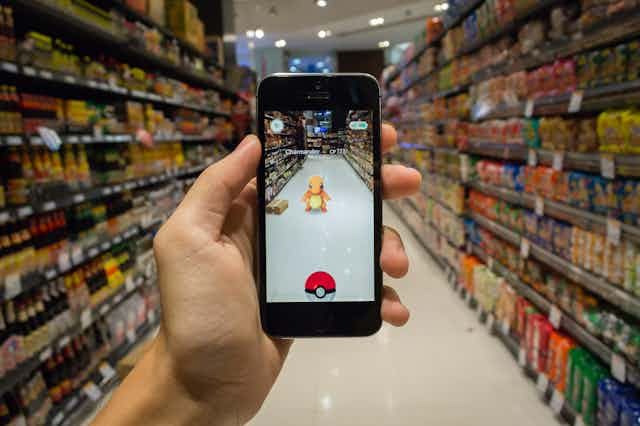Augmented reality game Pokémon Go has been downloaded more than 800m times, making it one of the most successful examples of location-based media to date. Although its popularity peaked and then plummeted in 2016, it’s still being played by roughly 5m people all over the world on a daily basis – and our research shows it’s making a real difference to their lives.
The game blends physical space with digital information, turning players’ smart phone screens into a portal through which they can find and capture Pokémon, train them at gyms and visit PokéStops – all within their everyday environment.
Older forms of location-based media, such as the 2004 game Mogi (where GPS tracking enabled players to collect virtual objects scattered around the streets) failed to withstand the test of time. But Pokémon Go is different. Its visually stimulating and innovative interface gives players a more immersive experience – and this kept them coming back.
We wanted to understand how the game continues to affect these players lives: in particular, we wanted to know whether playing Pokémon Go pushes people to spend more time outside, experiment with different routes through their surroundings or interact socially with other players.
So, between May and July 2017, we set up a 30-minute online survey. It was completed by 375 Pokémon Go users across the globe, primarily from the UK and US but also from Europe, Australia, the Middle East and Canada. In the context of 5m daily players, 375 may sound like a small sample. But the depth and richness of the data provided by these players, and the recurring themes we found across the sample, mean that we were able to extract an accurate set of findings about the motivations and behaviours of people who still play the game.
Get moving
We found that playing Pokémon Go had made a wide range of players more physically active. The game became a part of players’ daily routine, and made them want to spend more time outside exploring to find more Pokémon to catch, and new gyms to compete at. A number of players with physical disabilities reported that playing Pokémon Go helped them to overcome previously entrenched sedentary behaviours.
According to players in our study, Pokémon Go also affected how they approached public and private transportation. In some cases, this meant that players decided to walk to work, instead of taking the bus. In others, players would vary their routes by catching different trains to and from work. These decisions were often made with a view to extending travel, rather than reducing it.

Playing Pokémon Go also led people to find themselves in unexpected places. This resonates with older forms of location-based media, such as Foursquare, which could recommend new venues for users to visit, based on their previous history. Yet for the most part, this app led people to established places, such as bars and restaurants. In contrast, Pokémon Go players often found themselves in environments that really were out of their way, like the back of a restaurant, or a disused building site as Pokémon appear in unexpected and random environments.
A family affair
Our study also found that players didn’t always decide to play Pokémon Go because they had a personal interest in the game per se. A number of our respondents said that they started playing because their children wanted to, but were too young to own a smartphone themselves, or to play the game alone.
Here, parents used the experience of playing Pokémon Go to bond with their children, extend their familial relationships, explore their surrounding environment and monitor their childrens’ screen time. For them, Pokémon Go provided a new kind of joint media engagement, which differs from older forms of location-based media by providing space for parents and children to play and learn together.
Our research suggests that Pokémon Go has created a new kind of experience, which builds on previous forms of location-based media. Whereas the likes of Foursquare soon became unpopular when the novelty wore off, Pokémon Go has managed to create a seemingly more enduring experience – and one that its players seem to value for getting them out of the house, exploring and spending time with family.

